For many Americans, the refugee crisis was just another trip through the news cycle.
Near the end of 2015, government leaders called on the Obama administration to discontinue allowing Syrian refugees into the United States. That story overshadowed a similar crisis in which tens of thousands of women and children fleeing violence in Central America had been (and still are) showing up on our southern borders seeking asylum.
Since then, those with nothing truly invested in the debate have found new things to argue about, while those fleeing violence abroad have continued to leave behind everything they know for some promise of safety.
On Sunday, May 15, two Charlotte area events looked to spotlight the ongoing plight of refugees, asylum seekers and immigrants in America and the struggles they face within our borders and abroad.
At Levine Museum of the New South, a panel of immigrant and refugee community leaders discussed these issues at an event titled "Which Way Home: Refugees in Charlotte." Later that evening, people gathered at Assurance UMC in Huntersville to screen Salam Neighbor, a documentary showing what life is like for Syrian refugees in Jordanian refugee camps awaiting word — usually for many years — on whether they will return home or be granted refugee status in another country. The screening was followed by a discussion with Rachel Humphries, executive director of Refugee Support Services in Charlotte.
Creative Loafing sat in on both events to hear what these experts said were the biggest issues facing their organizations. The following excerpts were taken directly from discussions between those working every day to help immigrants, asylum seekers and the more than 600 refugees that come into Charlotte each year.
On the dangers that bring people here
Cat Bao Le, executive director, Southeast Asian Coalition
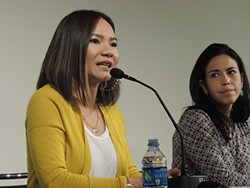
- Ryan Pitkin
- Cat Bao Le
"Oftentimes the same sort of conditions that cause people to seek refugee status [are happening in Central America], but for a lot of Central Americans and South Americans and folks at our southern border, that refugee process does not exist in our country. So people take the risk to come to the U.S. border through Mexico to seek asylum. It's the same conditions, it's the same reason why people come to the southern border that you see refugees from southeastern Asia or elsewhere going into bordering countries to try to get to a different place, but there's a different definition.
That's something that we're constantly trying to communicate to the public: it's not that one group of immigrants is better than the other because we have green cards. Sometimes that legal process just does not exist for people who are ironically closer to the U.S. border than those who are further away."
Atenas Burrola, immigration justice attorney, Legal Services of Southern Piedmont
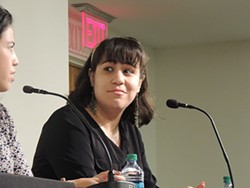
- Ryan Pitkin
- Atenas Burrola
"One of the largest misconceptions currently about one of our largest refugee groups is that they are not refugees. This unfortunately is a misconception that is coming from the top. The Obama administration is labeling tens of thousands of Central Americans who are fleeing violence and death in their countries as economic immigrants. They are refusing to treat them as refugees and they are putting them in jail, they are putting them in detention centers. They are holding them and their children in places that — someone who has just fled a life of domestic violence, extortion, rape — someone who just fled those things should not be living in a place like that. But, unfortunately, that group of people is not being labeled as refugees, they're being labeled as economic migrants and suffering from other myths we deal with, like that they are here to take our resources, which isn't true."
On the struggles immigrants and refugees face once they're here
Rachel Humphries, executive director, Refugee Support Services
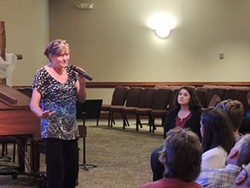
- Ryan Pitkin
- Rachel Humphries
"My experience in working with refugees is that every refugee wants to go home, because refugees did not choose this, it was forced on them. The definition of a refugee is someone who flees their country for fear of being persecuted to death, so it's not a choice. All of the refugees that I have interacted with just want to go home. For them, the U.S. is not always the land of milk and honey, it's very hard here. Everybody wants to go home, but what's the reality of that? The Montagnard [an indigenous culture from the highlands of Vietnam with a large presence in Charlotte] are working with the government of Cambodia for some land on the border of Vietnam for them to be able to move back. That's a long process. The Montagnard have been in Charlotte since 1980. That's a very long time to now think about going home. It's a tricky subject."
Sil Ganzo, founder and executive director, ourBRIDGE
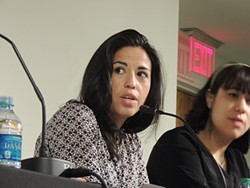
- Ryan Pitkin
- Sil Ganzo
"A lot of apartment complexes will take advantage of the refugees and immigrants living in these apartments. We have families who come to us saying, 'My neighbor was charged $30 for water this month and I'm charged $250,' or 'I complained to the city and now the manager doesn't want to take my check and now I am being evicted.' We try to contact the city but there's so many loops and so many steps that the families have to take in order to get it fixed and they are afraid. They don't know if they are going to get in trouble and they'd rather pay the $250 than go to jail because they are undocumented."
On the importance of integrating cultures
Nimish Bhatt, refugee and founder of Universal Institute for Successful Aging of the Carolinas
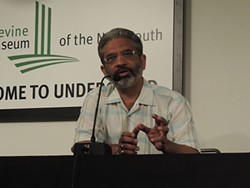
- Ryan Pitkin
- Nimish Bhatt
"Refugees, first of all, we must see them as humans like us. That takes half of the burden off. Once we see them as humans like us, then we will not feel like they are getting in our space, spending our resources. It should make you proud that our country is considered safer than their country and they're coming for a better life. The concept of seeing refugees as crossing borders for reasons to fight us — that concept that is creating some kind of insecurity — has to change."
Ganzo: "Something I feel very passionate about is teaching our newly arrived children about American culture and helping them learn the culture in our communities, but I think we're living behind a huge gap by not helping the American children acculturate to the newly arrived children. I know it sounds idealistic, but it would be a dream come true if every school, every office, every organization would have a class that will be like a cultural orientation for the American people who are working with newly arrived immigrants and refugees.
[At my children's school,] there are four languages being taught: German, Chinese, Japanese and French. They don't get cultural orientation in the languages that they are learning. They learn food and the very superficial part of the culture, but there's just so much more that goes into culture and I think the teachers at school should have the tools that they need to help children understand that being different is a good thing, instead of just not talking about it. We have kids pointing at each other or feeling afraid of somebody that they don't know because they look different. If we could teach our kids to be kind to each other from a very young age — 2-3 years old and up, pre-kindergarten — I think that they're going to grow up to be kind adults and that's what I feel would bring world peace. If we could all teach our kids to be kind to each other, to understand each other, to learn from each other, they're going to grow up to be nice people. I don't know if that's a policy that could be applied, giving those tools to the teachers to be culturally aware, but I think that would benefit everybody, the American culture and the unity of our culture."
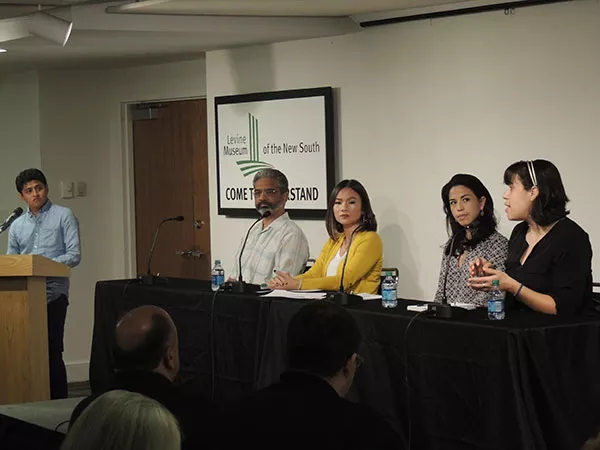
- Ryan Pitkin
- Panel at Levine Museum of the New South's event "Which Way Home: Refugees in Charlotte."
Bhatt: "It's very important to not look at everything from the point of religion. We have given so much importance to religion and forgot who we are as humans. What we don't see is that in the ways of humanity, we are all the same, but when we put religion there, we start to see it as a difference."
On a recent culture of fear surrounding refugees in U.S. politics and media
Humphries: "There is definitely fear right now, and especially about the Syrians. The fear around this culture group coming is dramatically increased compared to other culture groups. This group has just rocked our political world. The fear has heightened our awareness. The vetting process is so much more stringent on welcoming a refugee than it is on someone who comes here on a special visa or student visa. Look at the students who are coming, look at the special visas that we're giving out, because refugees have been vetted tremendously. The more we can see what it's really like and humanize the situation — and your voice to your neighbors and whomever you speak with will be very important. Yes, we need to stay heightened and be careful, but from a humanitarian standpoint, we have to remember that we're all in the same boat."
Bao Le: "We have heard a lot of anti-refugee sentiment — specifically regarding the unaccompanied minors [at the Mexican border] and the Syrian refugees — with people saying the Asian refugees are different. 'You guys are the good ones.' For some reason, people feel really comfortable saying that to SEAC and I think it's because us Asian-Americans are often seen as the safe immigrants and refugees. There's this whole idea that we assimilate in a way that they want other groups to. That ties into the U.S. and how we are quick to make a whole group into second-class citizens. That's happened throughout history and at one point, southeastern Asian refugees were that second-class citizen group. But as the Asian population we hear a lot of people playing us as the wedge, that unaccompanied minors are not really refugees like us because they're Latino. There's a linkage there that we can't forget and that we only know if we talk about our history and how it directly ties to the 50,000 unaccompanied minors that are now at our border."
On the importance of intersectionality
Bao Le: "One thing that we try to do in our organization, even though we're the Southeast Asian Coalition, we're very multi-racial and diverse. In a sense that other communities have similar issues as us, we find that it's best to have open doors and allow everyone in and we build from that foundational value. We can get into, 'We want the piece of the pie, and we want this over other communities,' but I don't think that's going to be helpful. That continues to divide us in a way where our strengths aren't pooled. We always identify that southeast Asians have a very high poverty rate. A lot of Cambodian, Laotian, Vietnamese refugee populations have a much higher rate of poverty than other Asian groups. Bangladesh has its own community in the U.S. and has a higher rate of poverty than Latinos and African Americans. You can take that in two ways: you can take that as, 'Wow, these communities need more support,' but you could also take it as, 'Well, that's a common denominator for our two communities to work hand-in-hand with Latino and African American communities so that we all are fighting for the same sort of results.'
All of our struggles are linked in a way that either you want to see them or you continue to not want to see them. For us it's a little bit of a harder day-to-day operation when our base is so diverse, but we feel like we have to do that. We were given a space at the table for the [City of Charlotte's] Immigration Integration Task Force, for example. That was the first time we were ever invited to a city forum, but at the same time, if we're not linked together, there's a reason why being at the table is just the first step. A lot of those recommendations that we spent a year coming up with have not been implemented. We can only put on the pressure as much as we can collectively put on the pressure. A place at the table is just not enough."
